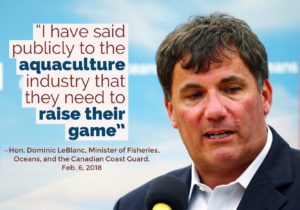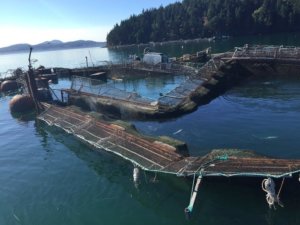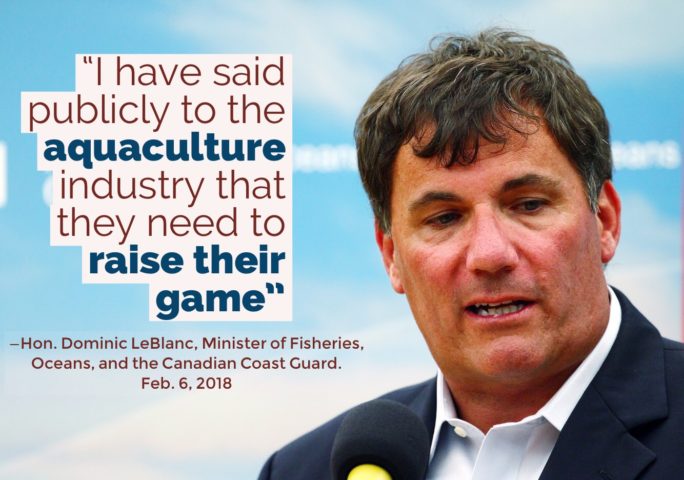
Washington State officials have terminated a lease with Cooke Aquaculture Pacific and fined the company $332,000 after a state investigation conducted last month revealed it had not adequately maintained the net pen that failed last summer and released hundreds of thousands of Atlantic salmon into Pacific Waters near Cypress Island in Washington.
The investigation also found that the company had grossly under reported the number of Atlantic salmon that had escaped — up to 205,000 fish, more than double Cooke’s revised estimates of about 100,000.
The company is fined for violating conditions of its water quality permit: poor net cleaning, failing to follow required protocol for repairs, and insufficient attention to engineering.
Cooke blamed the August 2017 collapse on “exceptionally high tides” but it was later revealed that the pen in question had suffered extensive damage the month before, and shortcut repairs were made without a professional review.

Additionally, poor maintenance caused mussels, seaweed and other marine life to build up on the structure, causing greater drag on the nets and setting the stage for the total failure in August. The lease required the net pens and mooring to be maintained “in good order and repair, in a clean, attractive and safe condition.”
“Cooke has flagrantly violated the terms of its lease at Cypress Island,” Public Lands Commissioner Hilary Franz said in a statement. “The company’s reckless disregard endangered the health of our waters and our people, and it will not be tolerated.”
Cooke Aquaculture is also facing opposition from treaty tribes in the area after chairmen from 21 tribes signed a letter to legislators asking lawmakers to shut down Atlantic salmon farming in Puget Sound, home to threatened and endangered species like the Puget Sound Chinook and orca whales. Fishermen and conservation groups have written lawmakers and testified in opposition to continued salmon farming in the area.
Since the August net pen collapse, Hilary Franz, state commissioner of public lands, has ordered inspections of all of Cooke’s facilities around Puget Sound. Franz announced the termination of a Cooke Aquaculture net pen lease in the Port Angeles area last month saying the company violated the terms of its lease by not maintaining the facility in a safe condition.
The presence of Atlantic salmon fish farms — and their potential to escape from net cages — has been a hotly debated topic on the West Coast for years. The Washington Department of Fish and Wildlife have put Atlantic salmon on their list of invasive species that are not regulated, but are considered “highly threatening,” over worries they could harm native fish stocks through competition, predation or disease transfer.
A guilty past in New Brunswick, too
This isn’t the first time that Cooke Aquaculture has been fined for its operations.
The company was charged under the Fisheries Act in 2011 for the illegal use of cypermethrin on several of their Bay of Fundy farms after the death of lobsters in nearby traps and holding areas. Cypermethrin is not approved for use on salmon farms in Canada, as it is toxic to lobster, shrimp, krill, copepods and other crustaceans that form the base of the food chain in the Bay of Fundy. Kelly Cove Salmon (a subsidiary of Cooke Aquaculture) was required to pay $500,000 in fines and payments, the largest penalty ever levied under the Fisheries Act in New Brunswick and among the largest ever levied in Canada. The cypermethrin was used at 15 sites near six different communities between October 2009 and November 2010 “in an effort to control sea lice infestation and the associated losses to the company.”
Cooke operates the majority of the roughly 100 open net-pen fish farm sites in the Bay of Fundy.
In 2013, the company lost upwards of 20,000 salmon from a sea cage on the south coast of Newfoundland, again blaming high tides and strong currents.

